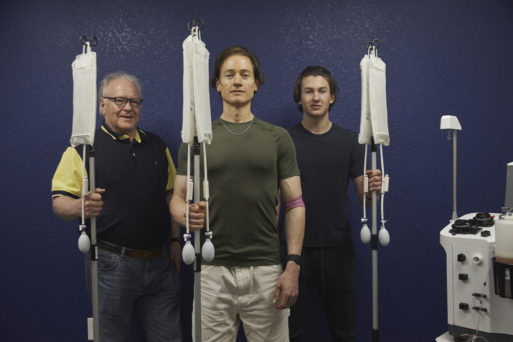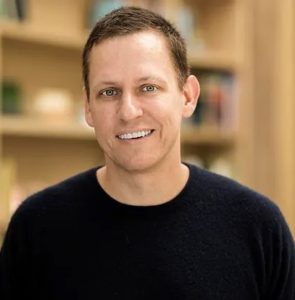
Both 45-year-old Bryan Johnson (center) and his 70-year-old father, Richard (left), receive plasma from the blood of Johnson’s 17-year old son, Talmage (right), on a regular basis as an experimental means to deter the aging process.
Photo Credit: Bryan Johnson
Thanks to medical and scientific advancements, our life expectancy has nearly doubled over the last century in the United States. But it seems the rich aren’t satisfied. They want to live even longer; some, forever. A few billionaires are now betting big bucks on anti-aging technologies, hoping to cheat death and prolong human life. And while the top 1% vie to achieve immortality, we the 99% may very well benefit from their selfish, greedy or surprisingly insightful endeavors.

Billionaire Peter Thiel was once accused of soliciting blood infusions from young donors in an effort to stay youthful for longer.
Photo Courtesy: Peter Thiel
Tech billionaires’ ambitious goals to turn back time have been appearing in news headlines for a number of years. Most recently, the NY Post reported on Bryan Johnson, the tech tycoon who is injecting himself with plasma donated from his 17-year old son, Talmage, in an effort to outsmart the aging cells in his body. The plasma swap, known as Project Blueprint, also includes Johnson’s father (Talmage’s grandfather), who receives doses of the young boy’s blood as well. A daily exercise regimen and strictly regulated diet, including 80 supplements a day, are also part of Johnson’s plan to stay young and healthy forever.
PayPal’s co-founder, Peter Thiel, has also been featured in recent headlines. In his most recent bid to live forever, Thiel wants to cryogenically freeze his body after death to be revived sometime in the future. Although he does not believe it is yet possible to do so, Theil has invested money in the technology, hoping that he might one day live again. The 55-year-old mogul commented, “In telling you that I’ve signed up for it [cryogenics], there’s always this reaction that it’s really crazy, it’s disturbing. But my take on it is it’s only disturbing because it challenges our complacency.”
But you don’t need to be older to want to prolong human life, just richer. Sam Altman, the artificial intelligence guru who launched Chat GPT in 2022, is only 37 years old. But according to MIT Technology Review, the AI genius is wasting little time in thinking about his future. Altman recently invested $180 million in a startup called Retro Biosciences. The company aims to reprogram cells and design therapeutics to increase the human lifespan by 10 years. Altman’s investment is the largest to date for any biotech company. Amazon founder Jeff Bezos is one of many heavy investors reportedly backing a similar startup biotech company, Altos Labs.

Elon Musk founded Neuralink, a company creating brain implants. Their website states: “Brain-computer interfaces have the potential to change lives for the better. We want to bring this technology from the lab into peoples’ homes.”
Elon Musk is a man well-known for taking his big ideas to the bank, including his electric car innovation, Tesla, and SpaceX, his company that designs, manufactures, and launches rockets and spacecraft. So, it is no surprise that Musk took his personal desire to prolong human life into his own magic money-making hands. Musk is founder and CEO of Neuralink, a company developing a brain chip that can read and stimulate electrical pulses in the brain. This technology could be used to assist those paralyzed from stroke to operate robotic limbs. It is also considered a potential future game-changer for degenerative brain diseases like Parkinson’s or dementia. During its 2020 unveiling, Musk told ABC News, “It’s like a Fitbit in your skull with tiny wires.”
Scientific Scrutiny
Neuralink received FDA approval in May 2023 to begin its first human clinical trial. But the approval comes on the tail of an ongoing federal investigation by the USDA into the company’s overuse of animal testing. Employees claim that animals suffered under extreme conditions during botched experiments due to pressure from Musk to speed up testing and streamline the FDA approval process.
The investigation is a prime example of concerns about safety and rushing science without regulatory oversight and accountability. Experiments that aim to prolong human life once only took place in government research institutions. But they are now often under the direction of those seeking answers only for themselves.

The Physicians Committee for Responsible Medicine opposes animal testing and brought concerns about Neuralink’s methods to the FDA.
Laurie Zoloth, a bioethicist with Northwestern University, shared her concerns about bioethical entrepreneurship in a recent interview: “Making scientific progress faster doesn’t necessarily mean better – unless if you’re an aging philanthropist and want an answer in your lifetime. Science is about an arc of knowledge, and it can take time to play out. Sometimes we won’t know answers for generations.”
The Future of Biotechnology
But, biotechnology research is a growing and booming business. The industry market size in 2022 was estimated at $190 billion in the U.S. alone, increasing nearly 5% in 2023. So whether we, the 99%, agree with the tenets of the wealthiest American entrepreneurs or not, perhaps we might benefit from one innovative idea that proves to prolong human life for us all.
Not only is biotechnology responsible for a wide range of medications and diagnostic testing commonly used today, but its research also seeks answers to address the climate crisis and food supply issues. In 2023, The White House Office of Science and Technology Policy outlined bold goals for its whole-of-government approach to expand biotech research. The outline recognized the need for infrastructure and workforce development. Goals included efforts to replace plastic, reduce greenhouse gas emissions, and increase access to cell-based therapies. Perhaps the policy will open up avenues that prolong human life for all Americans, whether rich or poor.

 Billionaires Invest in Technologies to Prolong Human Life
Billionaires Invest in Technologies to Prolong Human Life



 How to Comfort A Dying Loved One
How to Comfort A Dying Loved One
 Our Annual Seven Holiday Gifts for Someone Who Is Grieving, 2024 Edition
Our Annual Seven Holiday Gifts for Someone Who Is Grieving, 2024 Edition














